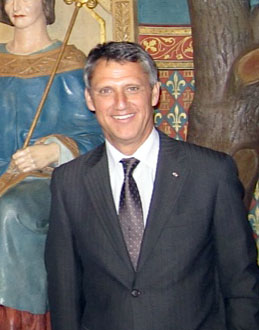H.E. Philippe Narmino is a trained magistrate and a graduate of the French Ecole Nationale de la Magistrature. Since 2006, he has served as Director of Judicial Services and President of the Council of State of the Principality of Monaco.
Can you explain your duties?
I am in charge of the Department of Justice. In 1918, the Judicial Services Directorate was organized separately from the administrative authority. I hold similar powers to those exercised by ministers of justice in other countries but I do not sit on the council of government. Sovereign rulings concerning legal departments are not deliberated by the council of government but are made by H.S.H. Prince Albert II based on the report of the Director of Judicial Services. The Judicial Services Directorate is separate from the Executive Services Directorate handled by the Minister of State.
You are the first Monegasque citizen to perform this role
Indeed. The senior public administration posts previously reserved for French nationals may be occupied by Monegasque citizens since the coming into force of the new Franco-Monegasque convention of 2005 on administrative cooperation, which was ratified in 2008.
When I was appointed in 2006, the two States were willing to anticipate that ratification.
Furthermore, this convention allows Monegasques to occupy all positions in the judiciary magistracy, which was not the case previously. Monegasque magistrates, like their French colleagues, are trained in France at the Ecole Nationale de la Magistrature.
In international instances, having a minister of justice of the same nationality as the country simplifies things, some doubts being raised with the interlocutors.
For the record, in 2009 the OECD (Organisation for Economic Cooperation and Development) removed Monaco from the list of non-transparent countries. In 2013, the OECD issued a positive assessment of Monaco, alongside countries such as Germany and the USA. How did you assist the Principality in order that it join a global transparency movement?
The desire for transparency is linked to Monaco’s accession to the Council of Europe on 5 October 2004.
The Judicial Services Directorate is the central authority for the application of certain international conventions adopted under the auspices of the United Nations, the Council of Europe and the Hague Conference on Private International Law.
I ensure that we are open to and respect judicial cooperation pertinent to these agreements. In Monaco - a cosmopolitan country - disputes often involve foreign elements, hence the need for the exchange of information.
We need to relate to a number of expert committees, such as MONEYVAL (Committee of Experts on the Evaluation of Anti-Money Laundering Measures and the Financing of Terrorism), GRECO (Group of States against Corruption), CEPEJ (European Commission for the Efficiency of Justice), and CPT (European Committee for the Prevention of Torture). I am very close to this.
Can you give us a practical example?
Last November, the latest CEPEJ report noted “‘the strong increase in Monaco’s justice budget”, which amounted to 9 million euro in 2010 and was increased by over a million euro in 2012. The report states that, “when reduced to the number of inhabitants (...) Monaco is in second position after Switzerland”. Although the 45 member countries of the Council of Europe are not comparable in many respects, this is satisfying. As regards the legal costs, they are borne by the Judicial Services Directorate, and many different means are available to magistrates - and particularly examining magistrates - with no limitation. The amounts are significant. This is a necessity if we are to have an independent justice system, free from administrative and budgetary constraints.
A country where 50,000 employees work compared with 36,000 inhabitants, and where 4,000 companies generate a turnover of several billion euro, is familiar with the trade-off of this economic dynamism – concerns with recourse to law. They relate to a variety of areas: construction, insurance, banking, inheritance etc. and even neighbourly problems! The list of civil or commercial law disputes is very long. Not to mention all the issues connected with company law, shareholder disputes etc.
Let’s go back to transparency. How do you foster it?
Transparency is ensured by judicial cooperation when a State officially asks us for information because an investigation is underway or proceedings in progress, and it needs to externally seek - in this case in Monaco - information necessary for its smooth continuity.
If the requesting State has signed an agreement with Monaco, that is applied.
Otherwise, we apply the principle of courtesy in force for relations between States. We agree to accomplish the request for information:
- providing we benefit from reciprocity
- and according to the principle of specialism: information obtained through judicial cooperation may not be used in proceedings other than that which gave rise to the request.
- a request for information for purely fiscal offences may be refused, in as much as the Principality of Monaco does not put into place direct taxation and therefore offences connected with fraud in that area.
In terms of organized VAT fraud, judicial cooperation is granted. It should be noted that Monaco lives with taxes - VAT, ownership transfer taxes etc. – we are not a tax haven. As you know, the main part of the world’s tax evasion is sought for outside Monaco. Moreover, at times the Principality goes further than pure exchange of information. Officials of the requesting State may move about in the required State, and vice versa.
Are your teams’ relations with the Monegasque Association of Financial Activities (AMAF) close?
For several years now, we have informed the AMAF of all civil justice rulings in the banking area (i.e. involving banks’ liability). Issues linked to bank liability are the subject of a number of court rulings every year, and the AMAF is not in ignorance of any of the rulings issued.






